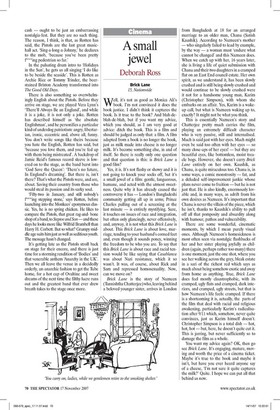A small jewel Deborah Ross Brick Lane 15, Nationwi
A small jewel Deborah Ross Brick Lane 15, Nationwide Well, it's not as good as Monica Ali's book. I'm not convinced it does the book justice. I didn't think it captures the book. Is it true to the book? And blah-deblah-de-blah, but if you want my advice, which you should, as I am very good at advice: ditch the book. This is a film and should be judged as only that: a film. A film adapted from a book is no longer the book, just as milk made into cheese is no longer milk It's become something else, in and of itself. So there is really only one question and that question is this: is Brick Lane a good film?
Yes, it is. It's not flashy or showy and it is not going to knock your socks off, but it's a small jewel of a film: gentle, languorous, humane, and acted with the utmost sweetness. Quite why it has already caused the controversy it has — London's Bangladeshi community getting all up in arms; Prince Charles pulling out of a screening at the last minute — is entirely mystifying. Sure, it touches on issues of race and integration, but often only glancingly, never offensively, and, anyway, it is not what this Brick Lane is about. This Brick Lane is about love, marriage, tending to your husband's corned feet and, even though it sounds poncy, winning the freedom to be who you are. To say that this Brick Lane is about race and racial tension would be like saying that Casablanca was about Nazi resistance, which it so wasn't. It was, of course, about Rick and Sam and repressed homosexuality. Now, can we move on?
Brick Lane is the story of Nazneen (Tannishtha Chatterjee) who, leaving behind a beloved younger sister, arrives in London from Bangladesh at 18 for an arranged marriage to an older man, Chanu (Satish Kaushik). According to Nazneen's mother — who singularly failed to lead by example, by the way — a woman must 'endure what cannot be changed' and this Nazneen does. When we catch up with her, 16 years later, she is living a life of quiet submission with Chanu and their two daughters in a cramped flat on an East End council estate. Her own spirit, as we understand it, has been slowly crushed and is still being slowly crushed and would continue to be slowly crushed were it not for a handsome young man, Karim (Christopher Simpson), with whom she embarks on an affair. Yes, Karim is a wakeup call, but what is Nazneen waking up to, exactly? It might not be what you think.
This is essentially Nazneen's story and Chatterjee pretty much carries the film, playing an extremely difficult character who is very passive, still and internalised. Much is said just with her eyes. Much might even be said too often with her eyes — so many close-ups of her eyes! — but they are beautiful eyes, like bottomless, moist treacle bogs. However, she doesn't carry Brick Lane entirely on her own. Kaushik, as Chanu, is quite miraculous too. Chanu is, in some ways, a comic monstrosity — fat, and a deluded self-improvement junkie whose plans never come to fruition — but he is not just that. He is also kindly, enormously lovable and, in many ways, as adrift from his own desires as Nazneen. It's important that Chanu is never the villain of the piece, which he isn't, thanks to Kaushik's ability to pull off all that pomposity and absurdity along with humour, pathos and vulnerability.
There are some wonderful, cinematic moments, by which I mean purely visual ones. Although Nazneen's homesickness is most often seen via nostalgic flashbacks of her and her sister playing joyfully as children (again, perhaps rather too many) there is one moment, just the one shot, where you see her walking across the grey, bleak estate in a sari of the richest red which says as much about being somehow exotic and away from home as anything. True, Brick Lane does feel mostly claustrophobic, with its cramped, ugly flats and cramped, dark interiors, and cramped, ugly streets, but that is how Nazneen's life feels: cramped. If there is a shortcoming it is, actually, the parts of the film that deal with racial and religious awakening, particularly Karim's radicalisation after 9/11 which, somehow, never quite convinces, just as Karim himself doesn't. Christopher Simpson is a total dish — hot, hot, hot — but, here, he doesn't quite cut it. This is jarring, but never sufficiently so to damage the film as a whole.
You want my advice again? OK, then go see Brick Lane. It's engaging, mature, moving and worth the price of a cinema ticket. Maybe it's true to the book and maybe it isn't, but have you ever heard anyone say of a cheese, 'I'm not sure it quite captures the milk?' Quite. I hope we can put all that behind us now.




































































 Previous page
Previous page